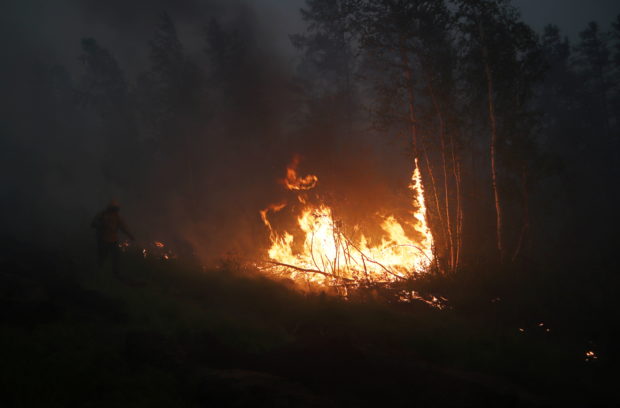
A firefighter works to extinguish a forest fire near the village of Magaras in the region of Yakutia, Russia July 17, 2021. REUTERS FILE PHOTO
YAKUTIA — Russian planes seeded clouds to bring down rain on huge wildfires raging in the Siberian region of Yakutia that in one place spread dangerously close to a hydroelectric power plant, authorities said on Monday.
Fires have flared across Russia amid a heatwave, tearing through over 1.5 million hectares of land in Yakutia, the worst-hit region. On Sunday, officials told people to stay indoors and to keep windows shut due to the smoke.
The regional capital Yakutsk, sometimes known as the planet’s coldest city, was forced to suspend flights at its airport due to bad visibility, and transport on the river Lena that carves through Siberia was also interrupted.
Fires flare across Russian forest land annually, but they have become more intense in recent years amid unusually high temperatures across the northern Siberian tundra. Yakutia is itself in the grips of a heatwave.
In less than two months, fires in the region have spewed out around 150 megatons of carbon dioxide equivalent – close to the 2017 annual fossil fuel emissions of Venezuela, according to the Copernicus Atmosphere Monitoring Service (CAMS), part of an European Union observation program.
On Monday, a Beriev Be-200 amphibious plane flown in from another Siberian region joined a massive effort to contain the blaze involving more than 2,000 firefighters on the ground.
Around 123 fires raged on Monday over an area of more than 885,000 hectares, the region’s environment and forest ministry said.
Firefighters took special care to contain one fire covering 41,300 hectares, it said.
“There’s a natural water barrier from the river Vilyuy, but the fire is potentially dangerous for the … Svetlinskaya hydroelectric power station,” it said.
Smaller-scale fires burned in less remote parts of the country.
More than 6,500 firefighters fought to contain blazes across the country. In Karelia, a region that borders Finland, authorities evacuated more than 600 people from villages due to fires, the TASS news agency reported.